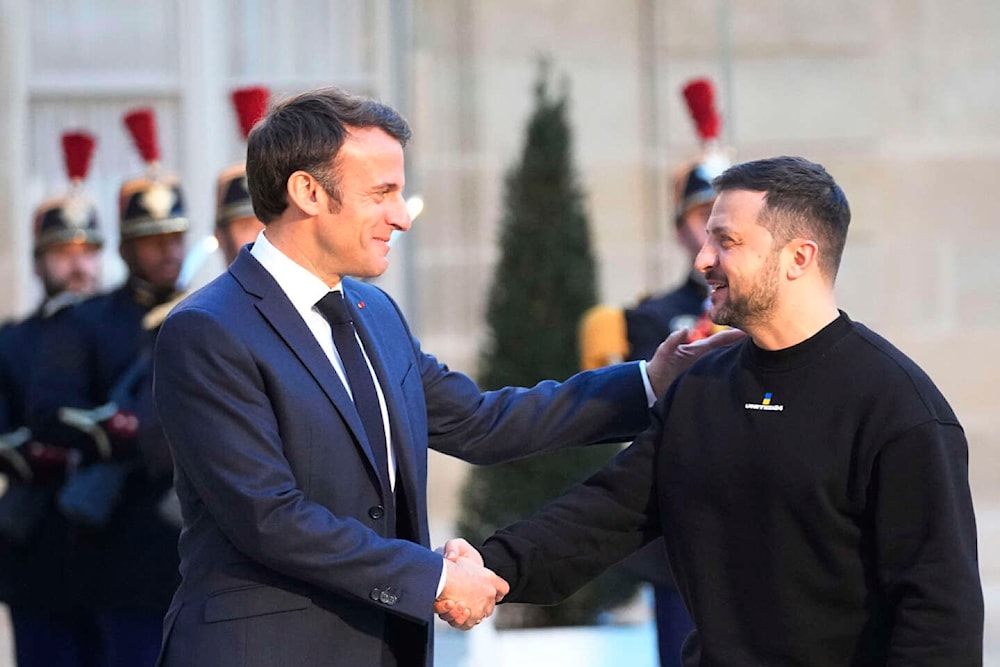Macron: Putin could be invited to France on D-Day celebrations
The French president says that this hangs on whether Putin is ready to engage in peace talks with Ukraine.
-

French President Emmanuel Macron, left, welcomes Ukrainian President Volodymyr Zelensky at the Elysee Palace in Paris, Sunday, May 14, 2023. (AFP)
In yet another change of tone, French President Emmanuel Macron said that Paris could issue an invite to Russian President Vladimir Putin to attend the 80th anniversary of D-Day in June, conditioning however that peace talks in Ukraine commence.
During a recent interview with state broadcaster France 5, Macron acknowledged the possibility of inviting Putin "if he holds peace talks and changes the situation" with Ukrainian President Volodomyr Zelensky.
Read more: Macron says Ukraine joining EU 'far off'
This comes just one week after the French leader said that the war in Ukraine has made relations with Moscow "virtually impossible," adding however that he is willing to take a call from Putin if he agrees to peace "that respects international law and therefore Ukrainian interests and sovereignty."
"I haven’t changed my number," the French leader said at the time.
Own chit-chat
Macron's remarks came in response to Putin's statements made last Thursday during the year-end marathon press conference.
The Russian president's last attendance at the Normandy celebrations was in 2014. However, In 2019, Paris did not invite the Russian president without providing any explanation.
Addressing Moscow's ties with Paris, the Russian leader said that they had a "quite good working relationship," but they went sour after Macron broke them off.
When asked about interest in mending ties, Putin replied yes, "if there is interest, If not, we’ll manage. We have other things to do," he continued. "But if we are imagining conspiracy theories, maybe Western leaders wanted to have their own chit-chat before having some contact with us," Putin told reporters.
"That doesn’t really matter. What matters is the truth about the history and about this horrible tragedy that happened to humanity during the Second World War."
Sabotaged talks
France has been one of the primary weapons suppliers to Ukraine since the onset of the war in February 2022. Despite repeated warnings from Moscow not to further involve itself in the conflict, Paris chose to maintain a policy aligned with the aggressive approach taken by the United States.
Meanwhile, Russia has declared its readiness on several occasions to engage in peace talks with Kiev, with the condition that Ukraine abandon its ambitions to join NATO and refrain from posing a threat to Russia by hosting foreign military bases.
However, attempts at peace were explicitly undermined by the US and the UK on multiple occasions, with the explanation that the timing was not suitable for negotiations or a ceasefire.
Read more: Scholz's low blow: Telling Orban to 'get coffee' during Ukraine vote
Shifting tides
However, several significant developments have led to a shift away from the current aggressive stance towards Russia.
Firstly, Western support for Ukraine has been dwindling over the past few months, exacerbated by Washington's announcement that it was running low on assistance to Kiev. This situation was further exacerbated by Ukraine's failed counter-offensive and its dire field position.
Secondly, Europe's resources are being depleted continuously, with no clear exit strategy in sight and diminishing hopes of Kiev achieving military successes that could weaken Russia.
Thirdly, the unexpected Israeli war on Gaza diverted much of the West's attention toward supporting "Israel", which is currently facing an unprecedented crisis.
These changes have prompted Kiev's backers to seek a more sustainable solution for the Eastern European country, which includes exploring the option of peace talks with Russia.
Read more: 'Not 1 more cent': Americans are done with funding Ukraine's paychecks

 4 Min Read
4 Min Read









